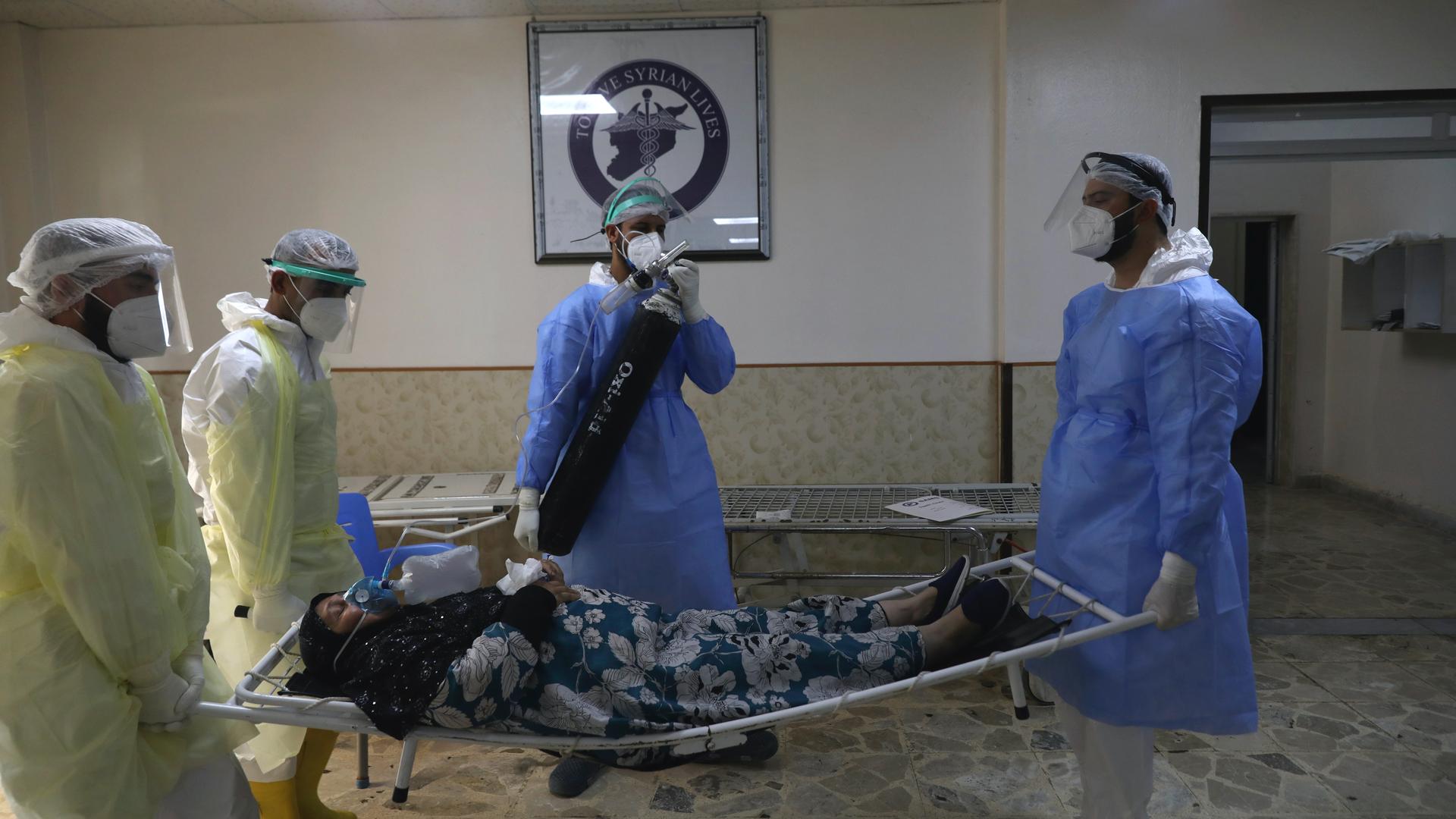It’s unclear whether the omicron variant has made its way to Idlib province in northwest Syria, but the area is still coming out of a deadly third wave of the coronavirus that began at the end of the summer.
“All our hospitals were overwhelmed, and there were no beds available,” Dr. Mustafa Edo said. “We had to create a home care team to take care of the patients in their homes.”
Edo, who used to head the health directorate in Idlib province, and now works as a program manager for a medical nongovernmental organization called MedGlobal, got COVID-19, as did his whole family.
Related: Report: Syrian government manipulates exchange rates to pocket aid money
The World Health Organization puts Syria’s official death toll from COVID-19 at about 3,000, but experts say that the real number could be much higher.
Tackling the coronavirus pandemic is challenging even for the most sophisticated medical systems in the world. But in Syria, a decade of civil war has decimated clinics and hospitals. Scores of doctors and nurses have either died or fled the country. Idlib is the last remaining area under opposition control; and the fighting there is still not over.
When The World reached Wassim Bakeer, the head of a health and community committee in Ariha district, he said there had been bombings that very day.
“There were bombings around some camps around Ma’arrat Misrin city,” he said. “And you know, there are a lot of challenges for people, especially in winter.”
Bakeer said that international NGOs helped set up three isolation centers in the area, including one near displacement camps.
At least 2 million people living in Idlib province are displaced from other parts of the country. Most live in crowded camps where contagious diseases like COVID-19 can spread quickly, explained Claire San Filippo, head of the mission for Syria for the medical NGO Médecins Sans Frontières.
Related: Syrian refugees and migrants in Turkey face a difficult decision to return home
She added that many displaced people simply cannot afford protective gear like masks.
“We talked to a resident in one of the camps who told us, ‘I can barely buy bread. When I have a choice, I always go for bread.’”
“We talked to a resident in one of the camps who told us, ‘I can barely buy bread. When I have a choice, I always go for bread,’” she said.
NGOs like MSF are providing protective gear to medical workers and running treatment centers and medical clinics, San Filippo added.
But when it comes to vaccinations, Syria is not doing well.
Less than 5% of the population is fully vaccinated — one of the lowest rates in the world.
Syria has received AstraZeneca and Chinese vaccines through COVAX, the global system set up to provide vaccines for lower-income countries.
But people are hesitant.
“People have limited trust in the public health care system,” San Filippo said. “There’s also a lack of knowledge regarding COVID, but a lot of the reason seems to be linked to the vaccine itself.”
Some Syrians, including some medical workers, are suspicious about foreign-made vaccines, she said.
Related: Drought in Iraq and Syria could totally collapse food system for millions, aid groups warn
Dr. Hala al-Ghawi, who is based in Turkey, said that’s what she saw, too, when she and her team conducted a study about vaccine hesitancy in northwestern Syria.
“Actually, the most difficult ones are doctors and medical staff,” she said, because they can influence a patient’s decision to get the vaccine or not.
The doctors told her they wanted to see more data, and they were concerned about reported side effects of the AstraZeneca vaccine, she said.
Ghawi also lamented the misinformation and disinformation about vaccines circulating online and on social media apps.
She said that health professionals are trying to counter them. And some organizations are trying mandates for health care workers.
“For their medical staff, they obligate them to have [the] vaccine. And if they do not commit, they will not continue their work at [the] hospital,” she said.
Meanwhile, a looming geopolitical decision could have big implications for people in northwest Syria.
Currently, there is only one official border crossing — NGOs use it to get supplies to Idlib province — the one with Turkey.
The United Nations Security Council is expected to hold a vote in January to decide whether to keep the crossing with Turkey open as part of a highly charged debate, with Syrians caught in the middle.
Zaher Sahloul, a Syrian physician with MedGlobal, said that closing that border would be catastrophic.
“This area, which is under the control of the opposition, is disconnected from the rest of Syria, so the only way to reach them is through Turkey,” he said. “That means children will have malnutrition; women who are pregnant won’t get prenatal care; patients with COVID won’t get treatment or oxygen or vaccination.”
Sahloul said he hopes that in the US, which is a Security Council member, the Biden administration will make it a priority to keep that border crossing into northwest Syria open.
Our coverage reaches millions each week, but only a small fraction of listeners contribute to sustain our program. We still need 224 more people to donate $100 or $10/monthly to unlock our $67,000 match. Will you help us get there today?
